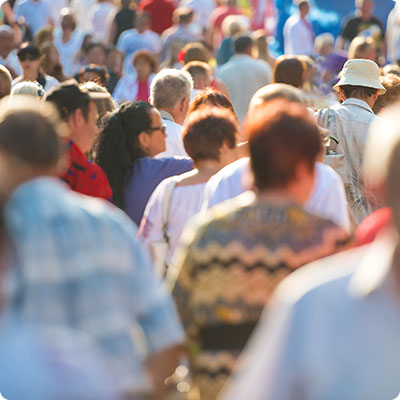
A high poverty rate
In Guadeloupe, six times as many people live in extreme poverty as in France (11%), a rate close to that of Romania. In other words, they suffer from a combination of material, monetary and psychological deprivation (not being able to eat a daily high-protein meal containing meat, fish or a vegetable substitute, not being able to buy new clothes, etc.). This situation is particularly prevalent among single-parent families, where women are often the sole carers of children - a very common family model in Guadeloupe. Senior citizens are not spared by this precarious situation, with 11% of retirees affected. Unemployment and high food prices (33% higher in Guadeloupe than in France) are factors that contribute to this situation. 17.6% of households are dependent on social benefits in Guadeloupe (source INSEE 2022).
Family, evolving models
Single-parent families are relatively common in Guadeloupe. Some Guadeloupean women are often left to fend for themselves with one or more children. These women are known as "Potomitan" women, who run the family. In Guadeloupe, there are still many multi-generational households. Over the past ten years, the search for family ties has intensified to offset the effects of city life and the Western model, thanks to the development of family gatherings and genealogical research. At the same time, however, there has been an increase in the number of elderly people living alone or in EPHAD, whereas the Guadeloupean model tended to keep the elderly within the family.
Men and women, characters marked
Dress and elegance are generally quite important, especially on Sundays when attending mass or public events. While the headdress has disappeared from everyday dress, traditional gold jewelry (creoles, coffee bean links, "tété négresse" earrings, etc.) is still very much in evidence. These adornments allow women to express themselves and assert their character. Despite the still-present machismo, many women have succeeded in imposing their ambitions with talent and efficiency on Guadeloupean society, and some have achieved genuine notoriety. Examples include Maryse Condé, Marie-José Alie, Tanya Saint-Val, Jocelyne Béroard, Mounia, Simone Schwartz-Bart.... Long-serving politicians such as Lucette Michaux-Chevry, a former minister who will die in 2021, Gabrielle Louis-Carabin (current mayor of Le Moule and the archipelago's longest-serving mayor), former prefect Marcelle Pierrot and former president of the departmental council Josette Borel-Lincertin. Men, on the other hand, are often gallant, but can sometimes be pushy towards women.
Security
While delinquency has risen in recent years, as elsewhere in the country, data for the French overseas territories are above the national average. In 2023, the homicide rate stood at 9.4 per 100,000 inhabitants in Guadeloupe, compared with an average of 1.5 homicides per 100,000 inhabitants for France as a whole. The main causes are settling of scores and gang violence. The island's insular nature means that weapons circulate widely in the archipelago. Over 10 years ago, the prefecture launched the "Let's lay down our arms" campaign to curb this scourge. Anyone wishing to dispose of a weapon can do so with the forces of law and order, without fear of prosecution. Several thousand weapons and munitions have been destroyed since 2013.
Drug trafficking is also on the rise, notably due to tighter controls in French Guiana, the main gateway for drugs from the Caribbean to France. Trafficking has recently refocused on the French West Indies, with a resurgence of mules at the airport. As a result, controls at the airport and the Grand Port Maritime have been stepped up.
In relation to the population, the number of road accidents is very high in Guadeloupe. Two-wheelers are particularly vulnerable. For several years now, the prefecture has been implementing campaigns to combat speeding and incivilities, and has stepped up roadside checks.
Petty crime does exist, and it's common sense to take precautions against it (don't leave any visible objects in your parked vehicle, avoid certain neighborhoods at night, don't carry large sums of money or high-value jewelry...).
Health
As Guadeloupe is a French department, the healthcare system is the same as in France, so don't forget your carte vitale! The archipelago boasts a brand-new university hospital in Perrin aux Abymes, scheduled to open in early 2025. The former CHU in Pointe-à-Pitre had been the island's main healthcare facility since the late 1970s. Affected by a major fire in 2017, it has been idling ever since. There is also a regional hospital (CHR, Basse-Terre) and several clinics (Baie-Mahault, Le Gosier, Le Moule, Trois-Rivières, Gourbeyre, Saint-Claude...).
Guadeloupe is one of the French territories most affected by the AIDS virus. In recent years, the number of HIV tests has remained stable (62 people diagnosed in 2020, 63 in 2021). Despite numerous prevention campaigns, condom use is not always systematic, particularly among young people.
There are regular epidemics of dengue fever in the West Indies, a virus transmitted by the tiger mosquito. Remember to protect yourself with repellent and to cover your body (light-colored clothing, long sleeves and pants), to guard against this.
The Covid-19 pandemic has given rise to great concern, with a particularly deadly fourth wave from July to October 2021. Nearly 1,000 deaths linked to the virus were recorded in the archipelago, out of a population of 383,600, poorly vaccinated and with numerous comorbidities. Hospitals in Pointe-à-Pitre and Basse-Terre were overwhelmed, and were first helped by private clinics, then by reinforcements from France. The subject of vaccination was particularly divisive among the population at the time of the compulsory vaccination pass. This rejection can be partly explained by the chlordecone scandal, which led to public distrust of the authorities.
Homosexuality
Homosexuality is still a relatively taboo subject in Guadeloupe. If things are changing, it's happening more slowly than in France, and it's still difficult to get people to speak out. The archipelago is a safe destination for LGBTQ+ people, but any open display of affection can expose people to unpleasant remarks or reactions.


















